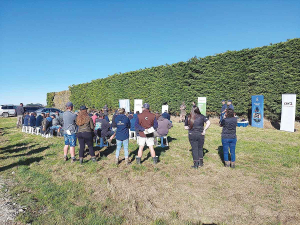Fewer bobby calves as dairy farmers shift to beef breeding
Fewer bobby calves are heading to the works this season, as more dairy farmers recognise the value of rearing calves for beef.
 CRV’s Better Herd on-farm events brought together local farmers and CRV experts to share practical insights.
CRV’s Better Herd on-farm events brought together local farmers and CRV experts to share practical insights.
With a higher forecast payout, falling interest rates, and renewed confidence in the dairy industry, farmers can move beyond day-to-day survival and plan how they can improve their herd long term.
That was the focus of CRV’s Better Herd on-farm events, held at eight locations across New Zealand last month. Now in their third year, these events bring together local farmers and CRV experts to share practical insights and advice on breeding more productive, efficient, and sustainable herds.
“With a stronger payout forecast and better mating results this season, farmers have more flexibility to make strategic breeding decisions,” says CRV managing director James Smallwood.
“Now is the time to focus on where replacements are coming from, improve herd fertility, and use the right genetics to strengthen herd performance and capitalise on the record payout.”
Helping farmers access the right tools
To build a stronger herd, farmers need the right tools - but cost can be a challenge. That’s why CRV is working with Fonterra through its Cooperative Difference programme to make herd testing and genetic tools like DNA testing more affordable and accessible, helping farmers improve efficiency and reduce emissions.
“Despite the benefits, for many farmers, the cost of these types of tools and services can be a barrier to making improvements,” says Smallwood.
“By working together across the industry, we can give farmers access to the right solutions and support to help them build more productive, lower-emission herds faster. For those committed to the Co-operative Difference, this is a great opportunity to strengthen their herd with funding support from Fonterra.”
The benefits of better herd management are clear. CRV myHERD Testing data shows that the top 25% of cows in every herd produce, on average, 165 kgMS more per season than the bottom 25%, while Fonterra data highlights that these top cows are over 16% more methane efficient per kgMS than the bottom 25%.
Strong mating results set farmers up for success
The timing for herd improvement couldn’t be better. Thanks to fine weather and good feed levels, this season has provided some of the best mating conditions in years. Early data from CRV showed a 4.3% increase in non-return rates compared to last year, with cows mated using sexed semen achieving an 8.4% year-on-year improvement.
“The data shows cows were cycling well and well-managed throughout mating,” says Smallwood.
“Even in Southland, where conditions were more challenging, farmers took quick action with OAD milking and careful management, leading to better-than-expected submission rates.”
These positive results set the stage for next season, as strong six-week incalf rates mean more compact calving, better recovery time, and earlier cycling and conception rates. With more farmers using sexed semen, the top 20% of cows are being selected for replacements, while conventional semen and beef genetics are being used more strategically across the herd.
“With the right tools and support, farmers can build a herd that’s not only more productive and fertile but also better prepared for the future,” he says.
“That’s exactly what our Better Herd events focused on – expert advice, practical tools, and proven solutions farmers can apply on their own farms.”
Donald Trump's latest tariff tantrum has again thrown the world of trade into a new round of turmoil and uncertainty, and NZ is caught up in it.
The third edition of the NZ Dairy Expo, held in mid-February in Matamata, has shown that the KISS principle (keep it simple stupid) was getting a positive response from exhibitors and visitors alike.
Twenty years ago, South African dairy farm manager Louis Vandenberg was sent to a farm in Waikato to provide training on Afimilk technology.
Strong farmgate milk price is helping boost investment on farms, says PGG Wrightson chief executive Stephen Guerin.
Fonterra's 460 milk suppliers in Australia, who will switch to Lactalis end of this month, are unfazed with the impending change.
The 5+ A Day Charitable Trust has launched a collection of affordable recipes designed to turn everyday vegetables into seasonal stars.
OPINION: Is it a case of over promising and under delivering? Farmers think so.
OPINION: The UK dairy industry is celebrating a win after plant-based drink maker Oatly lost a long-running legal battle over…